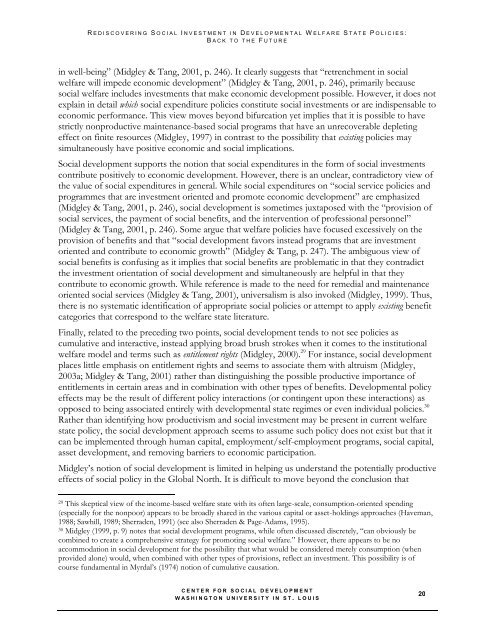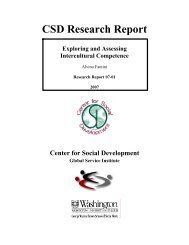Rediscovering social investment in developmental welfare state ...
Rediscovering social investment in developmental welfare state ...
Rediscovering social investment in developmental welfare state ...
You also want an ePaper? Increase the reach of your titles
YUMPU automatically turns print PDFs into web optimized ePapers that Google loves.
R E D I S C O V E R I N G S O C I A L I N V E S T M E N T I N D E V E L O P M E N T A L W E L F A R E S T A T E P O L I C I E S :<br />
B A C K T O T H E F U T U R E<br />
<strong>in</strong> well-be<strong>in</strong>g‖ (Midgley & Tang, 2001, p. 246). It clearly suggests that ―retrenchment <strong>in</strong> <strong>social</strong><br />
<strong>welfare</strong> will impede economic development‖ (Midgley & Tang, 2001, p. 246), primarily because<br />
<strong>social</strong> <strong>welfare</strong> <strong>in</strong>cludes <strong><strong>in</strong>vestment</strong>s that make economic development possible. However, it does not<br />
expla<strong>in</strong> <strong>in</strong> detail which <strong>social</strong> expenditure policies constitute <strong>social</strong> <strong><strong>in</strong>vestment</strong>s or are <strong>in</strong>dispensable to<br />
economic performance. This view moves beyond bifurcation yet implies that it is possible to have<br />
strictly nonproductive ma<strong>in</strong>tenance-based <strong>social</strong> programs that have an unrecoverable deplet<strong>in</strong>g<br />
effect on f<strong>in</strong>ite resources (Midgley, 1997) <strong>in</strong> contrast to the possibility that exist<strong>in</strong>g policies may<br />
simultaneously have positive economic and <strong>social</strong> implications.<br />
Social development supports the notion that <strong>social</strong> expenditures <strong>in</strong> the form of <strong>social</strong> <strong><strong>in</strong>vestment</strong>s<br />
contribute positively to economic development. However, there is an unclear, contradictory view of<br />
the value of <strong>social</strong> expenditures <strong>in</strong> general. While <strong>social</strong> expenditures on ―<strong>social</strong> service policies and<br />
programmes that are <strong><strong>in</strong>vestment</strong> oriented and promote economic development‖ are emphasized<br />
(Midgley & Tang, 2001, p. 246), <strong>social</strong> development is sometimes juxtaposed with the ―provision of<br />
<strong>social</strong> services, the payment of <strong>social</strong> benefits, and the <strong>in</strong>tervention of professional personnel‖<br />
(Midgley & Tang, 2001, p. 246). Some argue that <strong>welfare</strong> policies have focused excessively on the<br />
provision of benefits and that ―<strong>social</strong> development favors <strong>in</strong>stead programs that are <strong><strong>in</strong>vestment</strong><br />
oriented and contribute to economic growth‖ (Midgley & Tang, p. 247). The ambiguous view of<br />
<strong>social</strong> benefits is confus<strong>in</strong>g as it implies that <strong>social</strong> benefits are problematic <strong>in</strong> that they contradict<br />
the <strong><strong>in</strong>vestment</strong> orientation of <strong>social</strong> development and simultaneously are helpful <strong>in</strong> that they<br />
contribute to economic growth. While reference is made to the need for remedial and ma<strong>in</strong>tenance<br />
oriented <strong>social</strong> services (Midgley & Tang, 2001), universalism is also <strong>in</strong>voked (Midgley, 1999). Thus,<br />
there is no systematic identification of appropriate <strong>social</strong> policies or attempt to apply exist<strong>in</strong>g benefit<br />
categories that correspond to the <strong>welfare</strong> <strong>state</strong> literature.<br />
F<strong>in</strong>ally, related to the preced<strong>in</strong>g two po<strong>in</strong>ts, <strong>social</strong> development tends to not see policies as<br />
cumulative and <strong>in</strong>teractive, <strong>in</strong>stead apply<strong>in</strong>g broad brush strokes when it comes to the <strong>in</strong>stitutional<br />
<strong>welfare</strong> model and terms such as entitlement rights (Midgley, 2000). 29 For <strong>in</strong>stance, <strong>social</strong> development<br />
places little emphasis on entitlement rights and seems to associate them with altruism (Midgley,<br />
2003a; Midgley & Tang, 2001) rather than dist<strong>in</strong>guish<strong>in</strong>g the possible productive importance of<br />
entitlements <strong>in</strong> certa<strong>in</strong> areas and <strong>in</strong> comb<strong>in</strong>ation with other types of benefits. Developmental policy<br />
effects may be the result of different policy <strong>in</strong>teractions (or cont<strong>in</strong>gent upon these <strong>in</strong>teractions) as<br />
opposed to be<strong>in</strong>g associated entirely with <strong>developmental</strong> <strong>state</strong> regimes or even <strong>in</strong>dividual policies. 30<br />
Rather than identify<strong>in</strong>g how productivism and <strong>social</strong> <strong><strong>in</strong>vestment</strong> may be present <strong>in</strong> current <strong>welfare</strong><br />
<strong>state</strong> policy, the <strong>social</strong> development approach seems to assume such policy does not exist but that it<br />
can be implemented through human capital, employment/self-employment programs, <strong>social</strong> capital,<br />
asset development, and remov<strong>in</strong>g barriers to economic participation.<br />
Midgley‘s notion of <strong>social</strong> development is limited <strong>in</strong> help<strong>in</strong>g us understand the potentially productive<br />
effects of <strong>social</strong> policy <strong>in</strong> the Global North. It is difficult to move beyond the conclusion that<br />
29 This skeptical view of the <strong>in</strong>come-based <strong>welfare</strong> <strong>state</strong> with its often large-scale, consumption-oriented spend<strong>in</strong>g<br />
(especially for the nonpoor) appears to be broadly shared <strong>in</strong> the various capital or asset-hold<strong>in</strong>gs approaches (Haveman,<br />
1988; Sawhill, 1989; Sherraden, 1991) (see also Sherraden & Page-Adams, 1995).<br />
30 Midgley (1999, p. 9) notes that <strong>social</strong> development programs, while often discussed discretely, ―can obviously be<br />
comb<strong>in</strong>ed to create a comprehensive strategy for promot<strong>in</strong>g <strong>social</strong> <strong>welfare</strong>.‖ However, there appears to be no<br />
accommodation <strong>in</strong> <strong>social</strong> development for the possibility that what would be considered merely consumption (when<br />
provided alone) would, when comb<strong>in</strong>ed with other types of provisions, reflect an <strong><strong>in</strong>vestment</strong>. This possibility is of<br />
course fundamental <strong>in</strong> Myrdal‘s (1974) notion of cumulative causation.<br />
C E N T E R F O R S O C I A L D E V E L O P M E N T<br />
W A S H I N G T O N U N I V E R S I T Y I N S T . L O U I S<br />
20
















